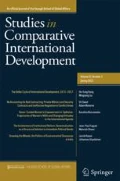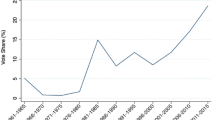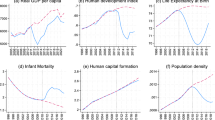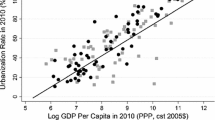Abstract
This note underscores the need for more precise causal theories linking the international division of labor, national economies, and public policies. To that end, the author recommends two literatures upon which a revised dependency theory might build, namely, those on economic geography and the political economy of redistribution.
Similar content being viewed by others
Notes
References
Adserá A, Boix C. Trade, democracy, and the size of the public sector: the political underpinnings of openness. Int Organ. 2002;56:229–62.
Evans P. Embedded autonomy: states and industrial transformation. Princeton: Princeton University Press; 1995.
Hirschman A. The strategy of economic development. New Haven: Yale University Press; 1958.
Iversen T. Capitalism, democracy, and welfare. Cambridge: Cambridge University Press; 2005.
Iversen, T, Cusak TR. 2000. The Causes of Welfare State Expansion: Deindustrialization or Globalization? World Polit. 2000;52:313–49.
Kohli A. State-directed development: political power and industrialization in the global periphery. New York: Cambridge University Press; 2004.
Krugman P. Geography and trade. Cambridge: MIT Press; 1991.
Krugman P. Technology, trade and factor prices. J Int Econ. 2000;50:51–71.
Lederman D, Maloney W, editors. Natural resources: neither curse nor destiny. Palo Alto: Stanford University Press; 2007.
Lindert P. Growing public. New York: Cambridge University Press; 2004.
Mares IM. The sources of business interest in social insurance. World Polit. 2003;55:229–58.
Moene KO, Wallerstein M. Inequality, social insurance, and redistribution. Am Polit Sci Rev. 2001;95:859–74.
Mosley L. Global capital and national governments. New York: Cambridge University Press; 2003.
Murphy K, Shleifer A, Vishny R. Income distribution, market size and industrialization. Q J Econ. 1989;3:537–64.
Pomerantz K. The great divergence: China, Europe, and the making of the modern world economy. Princeton: Princeton University Press; 2000.
Przeworski A, Wallerstein M. Structural dependence of the state on capital. Am Polit Sci Rev. 1988;83:11–29.
Rodrik D. Why do open economies have bigger governments? J Polit Econ. 1998;106:997–1032.
Schwartzm H. Dependency or institutions? Economic geography, causal mechanisms, and logic in the understanding of development. Stud Comp Int Dev. 2007;42:115–35.
Venables A. Trade, location, and development: an overview of theory. In: Lederman and Maloney, editors. Natural resources: neither curse nor destiny. Palo Alto: Stanford University Press; 2007;259–288.
Wright G. Resource based growth, then and now. Manuscript, Stanford University Department of Economics; 2001.
Acknowledgment
Erik Wibbels would like to thank Rich Snyder and Patrick Heller for their critical engagement with an earlier draft of these pages.
Author information
Authors and Affiliations
Corresponding author
Rights and permissions
About this article
Cite this article
Wibbels, E. Cores, Peripheries, and Contemporary Political Economy. St Comp Int Dev 44, 441–449 (2009). https://doi.org/10.1007/s12116-009-9044-1
Published:
Issue Date:
DOI: https://doi.org/10.1007/s12116-009-9044-1




